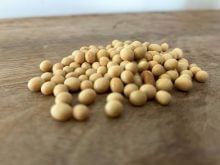By Theopolis Waters
CHICAGO, Oct 7 (Reuters) – Chicago Mercantile Exchange live cattle futures finished weaker on Friday on weekend positioning after traders sold nearby contracts and bought deferred months in a strategy known as bear spreading, said traders.
October ended down 0.550 cent per pound lower at 101.875 cents, and December down 0.050 cent to 103.050 cents.
“I think that today was another ho-hum day as traders tried to figure out what the cash will do next week,” said Oak Investment Group president Joe Ocrant.
Participants accounted for this week’s prices for slaughter-ready, or cash, cattle while looking ahead to next week’s sales against the backdrop of ample supplies and tepid wholesale beef demand.
Read Also

U.S. grains: soybeans firm ahead of USDA data
Chicago soybeans ticked up slightly on Wednesday as traders adjusted positions ahead of the release of official U.S. data on global supply and demand on Friday, the first update in weeks, but prices were capped by a lack of large Chinese purchases.
This week packers in the U.S. Plains bought cash cattle for $101 to $103 per cwt, steady to $3 lower than a week earlier.
Friday afternoon’s choice beef price dropped 41 cents per cwt from Thursday to $183.07.
Select cuts were down 55 cents to $174.51, the U.S.
Department of Agriculture said.
CME feeder cattle closed flat to weaker on front-month live cattle market weakness and this week’s lower cash feeder cattle prices.
October feeder cattle closed down 0.200 cent per pound to 127.625 cents, and November was unchanged at 122.775 cents.
LEAN HOGS CLOSED MOSTLY FIRM
CME October lean hogs, which will expire on Oct. 14, were supported by the discount to the exchange’s hog index for Oct. 5 at 54.36 cents, said traders.
CME October lean hogs closed up 0.300 cent per pound to 50.675 cents.
Most actively traded December ended 0.575 lower at 42.600 cents and February up 0.425 cent to 49.300 cents.
Speculative investors implemented bear spreads that consisted of selling December futures and buying deferred contracts driven by abundant hog supplies.
Smithfield Foods canceled Saturday kill operations at its Tar Heel, N.C. hog plant ahead of Hurricane Matthew, according to industry sources.
“Hogs possibly backing up on farms as a result of the shutdown is not good news for hog prices that have taken a beating the past several weeks.
I’m hoping the plant will be up and running again soon,” a trader said.
On Friday afternoon, the U.S. government estimated the industry’s overall Saturday hog slaughter at 236,000 head.
This would be down from analysts’ and Midwest hog merchants’ early-week projection of roughly 252,000 head.
Slaughter-ready, or cash, hog prices in Iowa/Minnesota on Friday afternoon were unchanged from Thursday at $46.96 per cwt.














